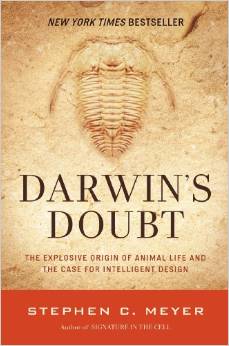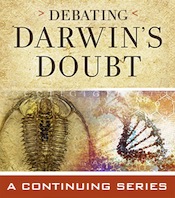 Evolution
Evolution
 Intelligent Design
Intelligent Design
Darwin’s Doubt Hits the 600 Review Mark on Amazon
 At the turn of the New Year, just over 18 months after its release, Stephen Meyer’s provocative bestseller Darwin’s Doubt: The Explosive Origin of Animal Life and the Case for Intelligent Design garnered its 600th Amazon review.
At the turn of the New Year, just over 18 months after its release, Stephen Meyer’s provocative bestseller Darwin’s Doubt: The Explosive Origin of Animal Life and the Case for Intelligent Design garnered its 600th Amazon review.
Based on my survey of similar titles, that makes Darwin’s Doubt the most reviewed book on the topic of biological origins among those listed on the Amazon website. It has now surpassed in number of reviews the most popular books representing the other major perspectives in the origins debate: theistic evolution, materialistic evolution (neo-Darwinism), and young earth creationism.
Consider, for example, Francis Collins’s book The Language of God, currently the most popular book listed at Amazon espousing theistic evolution and for a long time the most reviewed book on biological origins. Collins’s book, as of this writing, has received 600 reviews, while Darwin’s Doubt has received 612. Unlike The Language of God, however, which has been listed at Amazon since it’s 2007 publication date, Darwin’s Doubt has only been available for purchase at since June 2013.
Representing a young earth creationist perspective, Ken Ham’s The New Answers Book, published in 2007, has been reviewed 66 times, while his 1987 book The Lie: Evolution has collected 129 reviews since it became available on Amazon.
 Then there’s The Blind Watchmaker, by Richard Dawkins, the leading title representing orthodox neo-Darwinism. It has received only 440 reviews, though it was published in 1986 and presumably has been available for purchase on Amazon since the late 1990s or early 2000s. Other more recent Dawkins titles about evolution have also received a number of reviews — 2012’s The Magic of Reality, The Greatest Show on Earth (2009), and River Out of Eden (2008) — but none has surpassed the number Darwin’s Doubt has amassed in just a year and a half.
Then there’s The Blind Watchmaker, by Richard Dawkins, the leading title representing orthodox neo-Darwinism. It has received only 440 reviews, though it was published in 1986 and presumably has been available for purchase on Amazon since the late 1990s or early 2000s. Other more recent Dawkins titles about evolution have also received a number of reviews — 2012’s The Magic of Reality, The Greatest Show on Earth (2009), and River Out of Eden (2008) — but none has surpassed the number Darwin’s Doubt has amassed in just a year and a half.
Other leading books in the genre have also failed to illicit the intense interest of Meyer’s thesis as measured by the number of reviews. On the topic of the Cambrian explosion in particular, a book by James Valentine and Douglas Erwin — subtitled The Construction of Animal Biodiversity and released five months prior to Darwin’s Doubt — has garnered just 15 reviews so far.
Stephen Jay Gould’s Wonderful Life: The Burgess Shale and the Nature of History, out since 1990, has amassed 85 customer reviews. On the fossil record, geologist Donald Prothero’s 2007 book Evolution: What the Fossils Say and Why it Matters has 122 reviews. And biologist Jerry Coyne’s book Why Evolution is True, available since January 2010, has collected 340 reviews.
While the number of online reviews from ordinary readers is of course not the sole indicator of a book’s impact, it certainly does at least provide one useful gauge of a book’s impact on readers.
The reaction to Meyer’s book as expressed in the book reviews themselves provides another insight. The response to Darwin’s Doubt has been bi-modal, you might say, suggesting the book is either really good or really bad, or perhaps really good at upsetting people with a decidedly different view. While the vast majority of reviews have been overwhelmingly positive (84 percent at 4 or 5 stars), a small minority of one-star reviews is just as telling.
Materialists opposed to Meyer’s careful treatment of the issue have contributed aggressive reviews long on ad hominem attacks but short on substance. They hail Meyer and his work as "incompetent," "poorly misguided," "absurd fantasy," and a "steaming pile of pseudoscience." It’s clear Meyer has struck a nerve among those committed to a strictly materialistic understanding of the origin and evolution of life.
The intensity of the opposition is also evident in the comments posted about each positive review of Darwin’s Doubt. Almost immediately after someone says something good about the book, a posse of critics, usually the same critics, attempts to dissect the new review, mocking it by re-hashing arguments against intelligent design that Meyer has already rebutted extensively in his writing.
Nor do they tire of this exercise. The very first review of Darwin’s Doubt, posted the day after the book’s release in 2013 and written by a Paul Burnett, claimed that the title was about religion, not science, because it’s published by HarperOne. Burnett has been attacking positive reviews on Amazon ever since, restating the same point over and over.
And he’s not alone. Hiding behind the cloak of Internet secrecy, a reviewer going by the name Anonymous delights in laughing at every positive reviewer, using the word "hilarious" at every turn to belittle those who found Darwin’s Doubt to be compelling reading.
It’s clear that with Darwin’s Doubt, as with its predecessor Signature in the Cell, Dr. Meyer has provoked a spirited exchange that will continue to engage the public with its discussion of one of the principal debates of our time. But the book has not done that without stepping on some toes.
The 600th review of the book, posted on the last day of 2014, is a case in point. Giving the book a rare three stars, the reviewer laments that he did not look at the book carefully enough before giving it to his child to read: "I realized I had not paid attention to the whole title, and, to my horror, I had given to my scientifically inclined kid a book on religion."
He quickly rectified the mistake by having his daughter watch Neil deGrasse Tyson’s recent remake of Cosmos, which undoubtedly cleared everything up nicely.
Poor kid.
